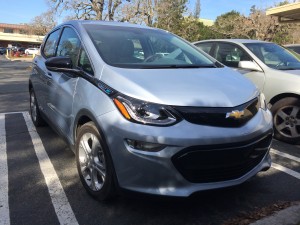The U.S. Environmental Protection Agency, under new management with the recent sacking of Scott Pruitt, will apparently be moving ahead next week with a proposed rollback of national fuel economy standards post 2020. The agency will also try for the first time in history to revoke a previously granted waiver to California to allow the state to set more aggressive standards and require automakers to produce a certain number of zero-emission vehicles, per E&E [pay-wall]:
EPA is expected to propose a rule in the coming days to prevent the standards from rising past the 2020 levels established under former President Obama, who hailed those increases as a major step toward addressing rising temperatures.
Also in the crosshairs is a California waiver under the Clean Air Act that allows it and more than a dozen other states to surpass federal car rules. EPA is expected to ask for comment on rescinding the waiver, a move that many see as a signal of the administration’s intent to do just that.
 The move will set off a battle royale of litigation, probably taking years to resolve and possibly relying on the swing vote of whomever fills Justice Kennedy’s seat on the U.S. Supreme Court.
The move will set off a battle royale of litigation, probably taking years to resolve and possibly relying on the swing vote of whomever fills Justice Kennedy’s seat on the U.S. Supreme Court.
If the agency is successful (and if Trump is re-elected in 2020), it will probably badly damage the electric car market in the U.S., particularly in California, where the ZEV mandate has been the critical policy tool for encouraging automakers to introduce new EV models.
All of this retrograde action sets the stage for China to eat our lunch:
China’s generous subsidies to electric vehicle makers have created a massive field of producers, and it’s only growing.
The industry is one of 10 identified for state investments three years ago as part of President Xi Jinping’s Made in China 2025 plan. A total of 487 companies currently exist, fueled by $15 billion in direct subsidies for EV sales over the last five years.
Those subsidies are still coming: In June, the National Development and Reform Commission and China Construction Bank Corp. announced an additional $47 billion fund for high-tech industries, including EVs.
While I’m happy to see international investment in EVs continue, it’s depressing to see the Trump Administration try to roll back progress on this environmentally crucial — and economically beneficial — clean transportation technology.


